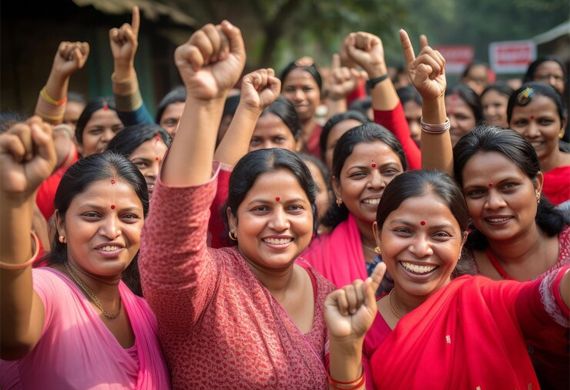
ISEC Report Finds Profit in Women's CSCs Post-Pandemic in India
By: WE Staff | Thursday, 4 April 2024
According to a study conducted by researchers from the Institute of Social Change and Economics (ISEC) funded by the Azim Premji Foundation found that India's Common Services Centres (CSCs) have emerged as crucial access points for the e-delivery of government services and schemes. The study was conducted in the regions of Bengaluru city, Bengaluru rural district, Ramanagara, and Mandya signifies the importance of small business entrepreneurship and women's empowerment.
In the respective regions, CSCs led by women are earning a significant amount by 2023 compared to the male-leading companies. This change was evident specifically during the pandemic, which suggests that these firms had a strong post-Covid comeback. By 2023, the non-metropolitan CSCs have reduced the pre-pandemic income gap in comparison to the metropolitan areas making greater income and indicating their growing success in non-metro regions.
In terms of the monthly income, it has been noted that women made, on average Rs 1,583 more in 2023 than male in the same category. However, this income disparity was witnessed between 2019 and 2022 but was evident after the post-pandemic commercial prospects. Women were more keen on taking advantage of the business climate after the pandemic, as said in the report.
Entrepreneurs typically invest Rs 1.2 lakh in CSCs, earning commissions for services delivered. The decentralized, e-platform model ensures transparency, provides new livelihood opportunities for women, and can include ancillary businesses.
The Indian business arena will acquire more than 5.7 lakh operational CSCs by February 2024, with about 4.48 lakh of them being found in rural areas. These centers are essential for services that drive welfare, Aadhar, and other government-to-citizen initiatives. CSCs have demonstrated their potential to eradicate the digital divide which exemplifies PM Modi's vision, to empower rural women through self-employment and increased access to essential services.
Most Viewed
- 1 Women's Health Startup HerMD Closing Doors Amid Industry Challenges
- 2 5 Famous Women in Indian Armed Forces
- 3 Saudi Women No longer Require Male Permission for Clothing Choices, says Prince MbS
- 4 Kolkata Medtech Startup Innovodigm Raises Rs 5.5 Crore Seed Funding Led by IAN Group
- 5 Yamunanagar's Kashish Kalra Honoured after Securing 111th Rank in UPSC Civil Services Exam
- 6 Madurai Appoints Its First Woman Corporation Head
- 7 IAS Vijayalakshmi Bidari Appointed as the new Nagpur Divisional Commissioner
- 8 American Entrepreneur Lucy Guo Overtakes T Swift to become Youngest Female Billionaire
- 9 ICC Women's World Cup 2025 Trophy Showcased at Indore's Holkar Stadium
- 10 Aparna Saxena's Beauty Venture AntiNorm Launches in India
- 11 Vidya Nataraj Co-Founded BlueStone Jewellery & Lifestyle files IPO
- 12 5 Women Freedom Fighters of India
- 13 Dr. G Krishnapriya appointed as CEO for Trichy
- 14 M3M & Sirona Partner to Introduce Menstrual Hygiene Vending Machines in 15 Locations
- 15 Punjab Govt launches SHE Cohort 3.0 Supporting Tech-led Women Startups
- 16 Indian origin Lawyer, Sweena Pannu appointed as the US New Superior Court Judge
- 17 The Aurora Tech Award recognizes 4 Indian Women-led Startups
- 18 Kerala's Republic Day parade featured an all-female tableau
- 19 Manisha Kabbur Becomes Karnataka's First Woman International Karate Coach
- 20 Director K. S. Ravikumar's Daughter Maalica Ravikumar Launches Life Coaching Company 'Evergrowth Academy' for Women
- 21 Leezu's Raises Pre-Seed Funding to Accelerate Growth in Sexual Wellness Industry
- 22 Sattu: Super-easy summer drink for PCOS gut healing
- 23 Swathi Nelabhatla creates Sitha App, India's First Women-Exclusive Gig Platform
- 24 7 Timeless Female Kathak Dancers & their Iconic Legacies
- 25 Meet 7 Iconic Women Architects of Modern India & their Most Impactful Work
- 26 This Woman-led Insuretech Startup is Helping Bridge the Education Financing Gap in India
- 27 Women Leaders Share Lessons Learnt from India Women's WC Win
- 28 5 Enterprising Women Founders Powering Singapore's Tech & Innovation Landscape
- 29 4 Women. 4 Stories. One Vision for Smarter, Stronger Healthcare
- 30 Global Gender Gap Narrows to 68.8%, But Full Equality 123 Years Away: WEF Report 2025
- 31 Changemakers: 7 Women Entrepreneurs Taking the Make in India Movement Forward
- 32 Meet Lucy Guo, The Youngest Self-Made Female Billionaire Disrupting Tech
- 33 How Women are Driving India's Festive Online Shopping Surge






